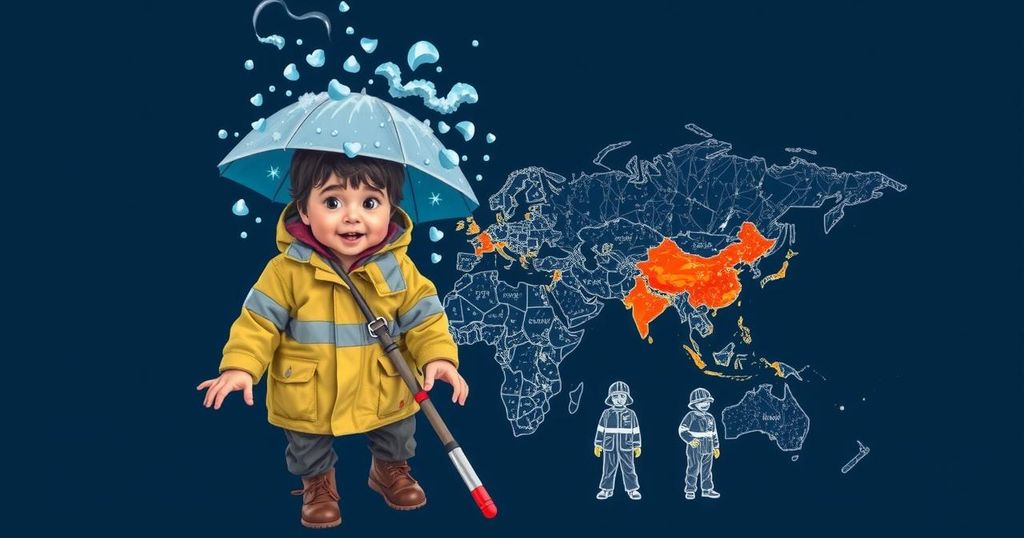One in Eight Children Affected by Extreme Weather Events in 2024

Save the Children reports that one in eight children worldwide has been impacted by major extreme weather events in 2024, with nearly 300 million affected globally. This phenomenon highlights the need for world leaders at COP29 to prioritize children’s rights and voices in climate discussions, particularly as many children in low-income regions face dire challenges related to displacement and access to education.
Recent findings by Save the Children reveal that approximately one in eight children worldwide has been significantly affected by the ten most severe extreme weather events in 2024. Nearly 300 million children across Asia, Africa, and Brazil have had their lives disrupted, facing challenges like displacement, reliance on humanitarian aid, and educational interruptions. As world leaders convene for the COP29 summit in Baku next week, there is an urgent call for the prioritization of children’s needs and rights within climate change responses, especially given that many affected children reside in low- and middle-income nations. The severe weather events included Tropical Storm Trami in the Philippines, which suspended schooling for 19.5 million children, and an unprecedented drought in Southern Africa that left 12.2 million children seeking humanitarian assistance. Flooding across West and Central Africa displaced millions of children, while a heatwave in South Asia pushed another 256 million out of schools. Children in regions from Bangladesh to Brazil are similarly suffering from floods and other climate disasters, which underscores the growing frequency and intensity of such events due to climate change. According to the World Meteorological Organization, the frequency of extreme weather events has risen fivefold over the past fifty years. Save the Children emphasizes the necessity of integrating children’s voices and experiences into climate discussions at COP29. Examples shared by affected children illustrate the devastation these extreme weather events have wrought on their education and future prospects. Kyariyam, a 12-year-old from Nigeria, described her traumatic experience of being displaced by flooding, stating, “The flood destroyed everything in our home… It’s something I will never forget.” Furthermore, Zinhle, a 14-year-old from Zimbabwe, expressed how the drought has jeopardized not only her family’s livelihood but also her schooling, highlighting severe food scarcity in her community. Inger Ashing, the CEO of Save the Children International, articulated the organization’s standpoint, noting that “climate change is not just a problem for future generations – it is a current and devastating crisis which this year alone has significantly impacted 1 in 10 of the world’s children.” Save the Children aims to assure that the voices of children are included in the New Collective Quantified Goal on Climate Finance (NCQG) and broader climate strategies. With the disproportionate impact of climate change felt within lower-income countries, it is imperative that global leaders advocate for immediate measures to address climate justice, focusing specifically on mitigating the unique vulnerabilities faced by children. As COP29 approaches, the call for urgent action and recognition of children’s rights within the climate crisis must not be overlooked, making it a vital topic for international discussions.
The impact of climate change poses significant threats to children, particularly in vulnerable low- and middle-income nations where extreme weather events exacerbate existing challenges such as poverty and access to education. This year alone, Save the Children has documented that severe climate incidents have directly affected a substantial number of children, emphasizing the need for world leaders to prioritize children in climate adaptation strategies. The increasing frequency of extreme weather events is established as a critical concern, further demanding concerted global attention and action to safeguard the futures of affected children.
The findings presented by Save the Children regarding the impact of extreme weather on children underscore an urgent need for action at the COP29 summit. The incorporation of children’s rights and responses to climate change into global discussions is vital for fostering climate justice. As adverse climate events escalate, particularly affecting the most vulnerable populations, it is crucial for world leaders to engage in strategies that protect and empower children amid this ongoing crisis.
Original Source: reliefweb.int






